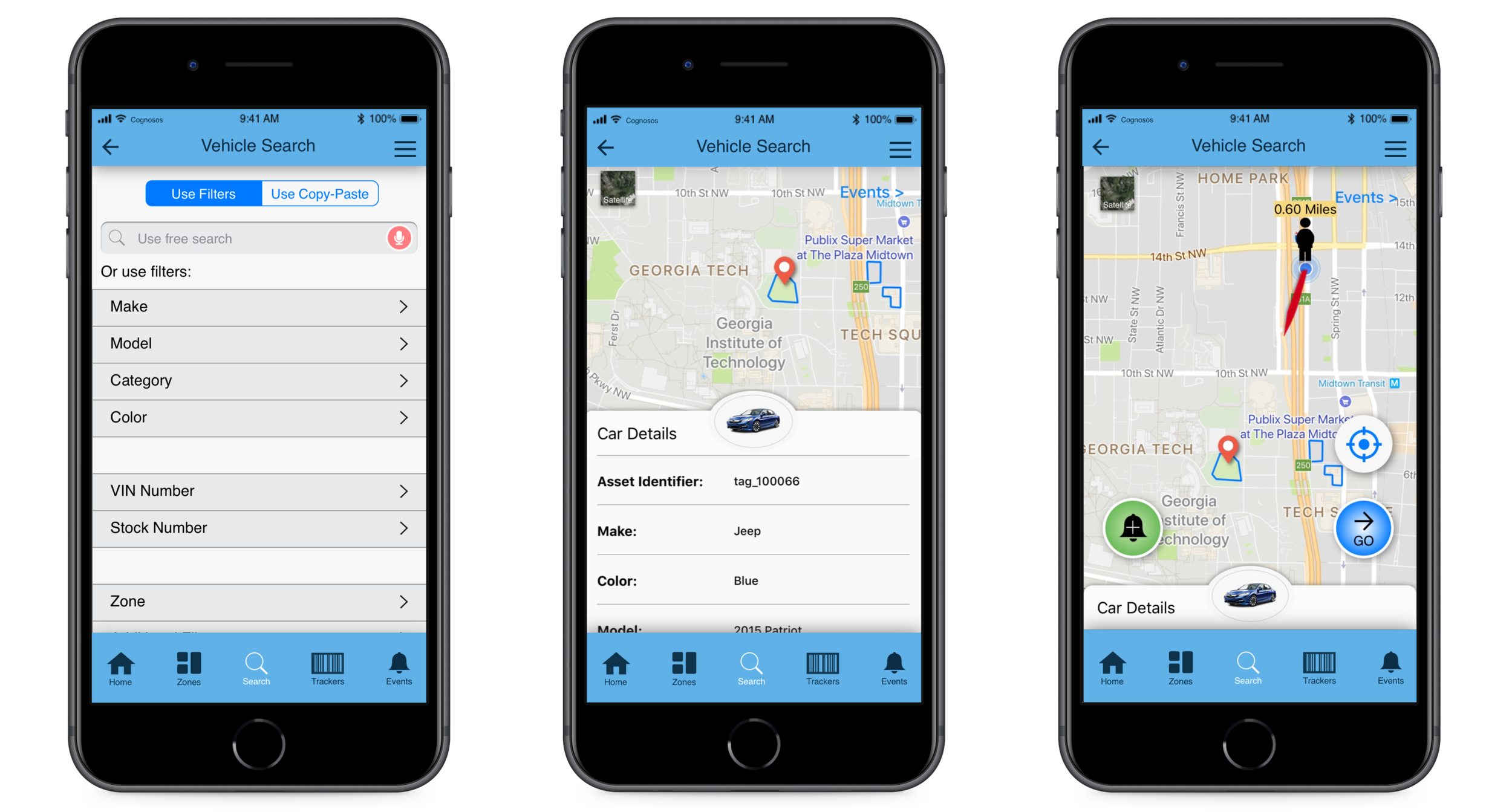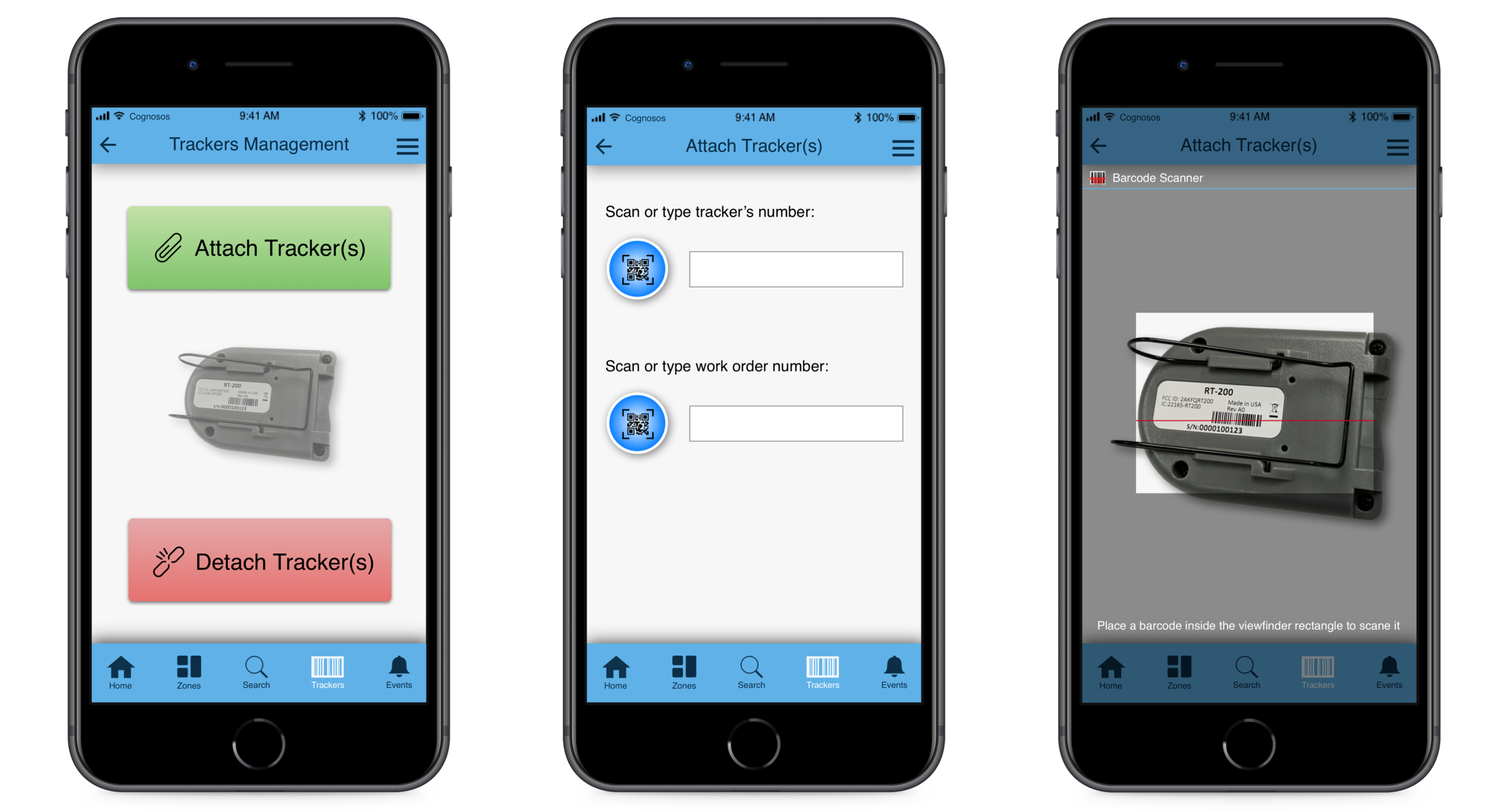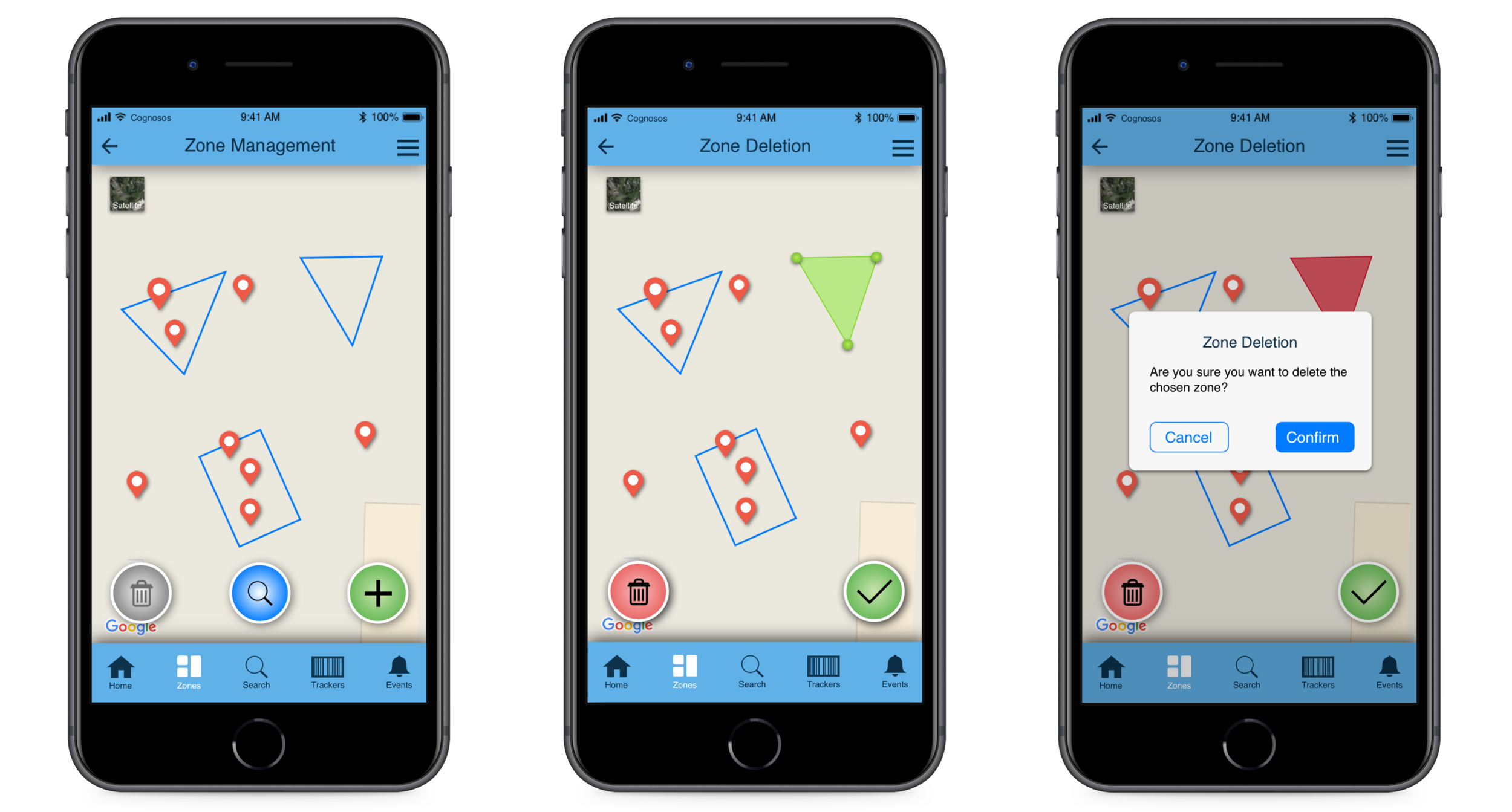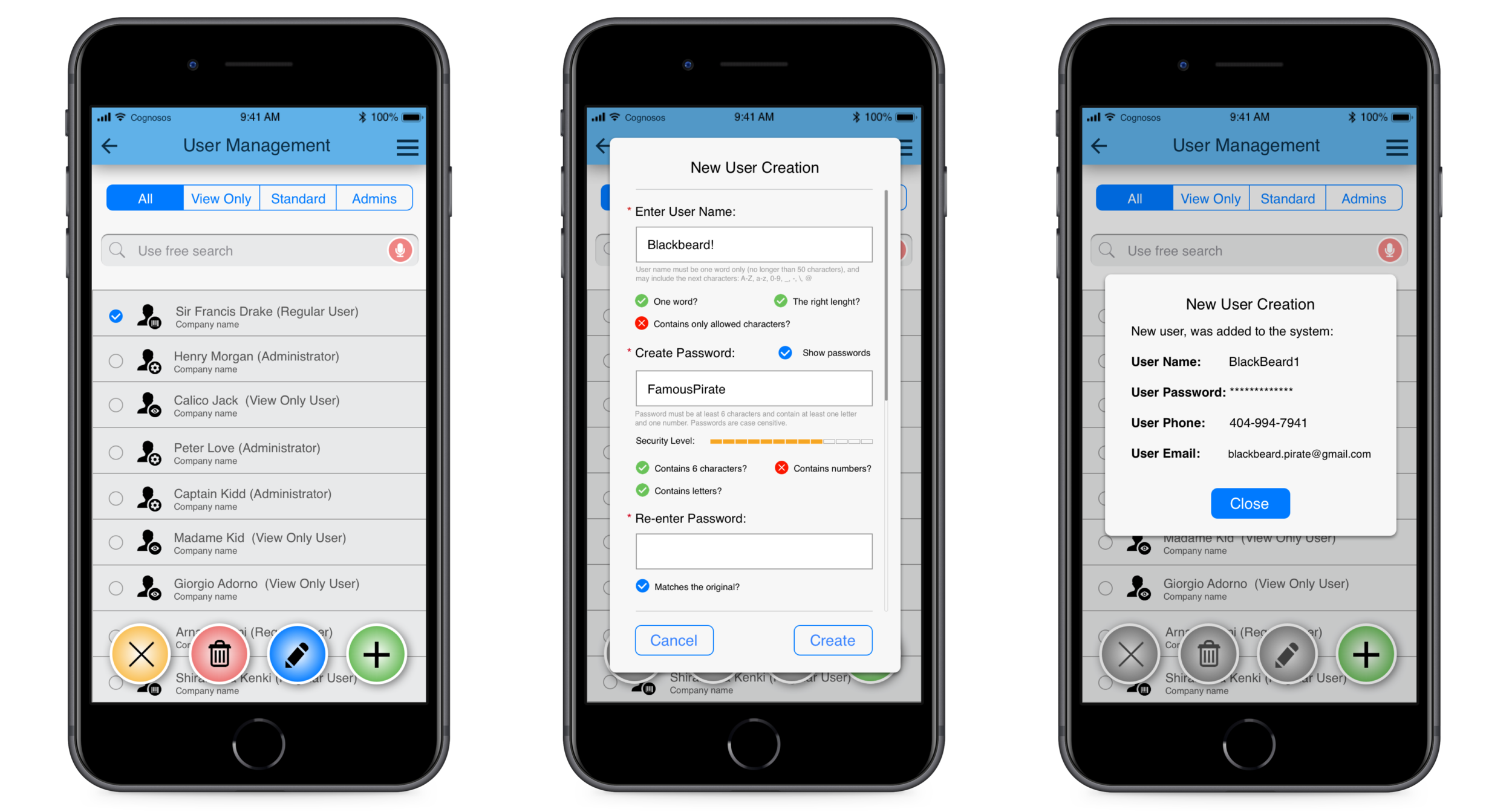RadioTrax - iOS Application
Project Description:
I joined Cognosos after they received a $7 million investment from Cox. At this time, Cognosos didn’t have an iOS application, and without it, the company couldn’t accomplish its strategic plan to expand the customer base and double the workforce.
The main purpose of the application (RadioTrax) is to locate and track vehicles in the vast parking lots of auctions, dealerships, and vehicle processing centers (VPCs). RadioTrax is essential since it solves the challenge of manually locating and tracking thousands of vehicles in huge parking lots, often times in extreme weather conditions.
The need for an iOS application was urgent, but there were no UX designers, project managers, or in-house iOS developers at Cognosos. I therefore had to design the application autonomously and under very strict time constraints. The development of the application was outsourced to an external provider while I served as the project lead.
Despite the challenges, the project was a success! The iOS application was adopted and is today used by hundreds of users on a daily basis across the US. Cognosos has expanded and increased its customer base by more than 10 fold, and I was hired on a full-time basis.
Design Process
Understanding the Existing Product
When I joined Cognosos, the company had a web-portal and an Android application, both of which were used by their two existing clients. Before introducing any changes, I wanted to understand the technology and to evaluate the existing solutions. To do so, I worked closely with the engineering teams and performed a heuristic evaluation of the Android application.
My main takeaways:
Lack of fundamental functionalities - the existing technology did not allow for filtration of assets by attribute, nor did it enable effective navigation in a physical environment without streets or buildings.
Undiscoverable features - while the application was well engineered, it required much cognitive effort to discover existing features and the logical relationships among them.
Outdated branding - the image of an innovative, yet reliable company failed to be communicated to users.
Contextual Inquiry
Limited access to the existing user-base led me to pursue every possible opportunity to visit customers’ sites and communicate with clients directly. On one occasion, I volunteered to join our engineers on a site visit to help replace discharged batteries inside our trackers. During this visit I had the chance to do a guerilla interview, which helped me understand the importance of minimizing the number of interactions required for attachment and detachment of trackers to cars. I also experienced firsthand how challenging it is to find vehicles in a vast parking lot on a hot, summer day…
Low Fidelity Prototyping
Initially, our product manager had planned to outsource the graphic design, and I was guided to focus on wire-framing alone. After understanding the problem and gathering the requirements, I started an iterative ideation phase followed by several internal design critiques. To ensure that our contractors would understand the suggested flow, I mapped out the interactions using free-hand sketching and InVision.
User Testing
Because of limited time and resources, it wasn’t possible to perform usability testing with actual RadioTrax users, yet it remained crucial to validate the proposed solution prior to the development phase. Therefore, I performed seven user interviews with the engineers on our team.
High Fidelity Prototyping
We delivered the low-fidelity prototype to our graphic designer, but our management wasn’t happy with the suggested solution, and requested that I create a high-fidelity prototype for all screens of the application. The high-fidelity prototype not only helped to re-brand the product and provide exact specifications to the development team, but also supported our discovery of design gaps and nuances that hadn't been visible in low fidelity.




Final Result
To demonstrate the attachment-detachment scenarios using the iOS application, our support engineers and I drove to one of our customers’ sites in southern Georgia and filmed the video below. Due to budget constraints, the narration and the editing were also done in-house: I was responsible for directing, filming, scripting, and editing the video.
Tracker attachment - detachment demonstration using RadioTrax on iOS (length: 1 min 52 sec)
Watching the video with audio on, will significantly improve the watching experience
Outcomes
Despite the challenges, the project was a success!
Expansion of customer base - releasing the iOS application allowed Cognosos to run an aggressive sales campaign, which increased our customer base ten-fold. Today we have more than 20 customers spread over diverse industries.
Doubling workforce - when I first joined Cognosos, we had nine full-time employees. Today we have 20 full time employees along with many part-time contractors and interns.
Reducing costs and increasing revenue - the application was successfully adopted and is used on a daily basis by hundreds of users. Using the application reduces operational costs, increases revenue, and saves valuable time.
What did I Learn?
Releasing a good product fast is better than releasing “the perfect product” - wrongly designed interaction or incorrect placement of a button can make a difference between a happy and a frustrated user, and yet, there is no such thing as “the perfect product”; The more time and thought invested in a design, the better it becomes. However, in our competitive world, it’s extremely important to release a product as soon as possible. Otherwise, a competitor will win the deal, and the best design will be in vain… Of course, improvements can (and should) be made in the next releases.
It’s not sufficient to design a pixel perfect prototype - there is a difference between designing a pixel perfect prototype and releasing a product. In order to convert vision to reality, one must engage the development team and essentially share ownership of the product, leading them to create reality out of vision. This takes effort, patience, dedication, ability to make compromises, and sound leadership.
Testimonials
“ … Felix is an amazingly creative designer. He really gets usability for all kinds of products including software and designs products for real users and not for developers. I highly recommend his work for any firm that needs to upend their old paradigms around usability …” (read more).
“ … Cognosos has greatly increased the efficiency of our auction facilities! Whether a vehicle needs a mechanical check or in-depth service, Cognosos has made locating the vehicles on our 40 acre lot a breeze... ” (read more).


